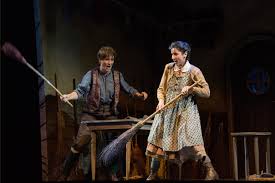Opera, Hansel and Gretel
Background
Hansel and Gretel, composed by Engelbert Humperdinck, made its debut in Weimar under the baton of Richard Strauss in 1893, and shortly thereafter, it premiered in Hamburg on September 25, 1894, with Gustav Mahler conducting. The opera's popularity quickly spread beyond Germany, with performances in Basel, Switzerland, and London's Daly's Theatre in December 1894. Its American premiere followed in New York on October 8, 1895, marking its entry into the United States. Australia experienced its first taste of the enchanting tale on April 6, 1907, at the Princess Theatre in Melbourne. Throughout its journey across English-speaking countries, Hansel and Gretel has predominantly been performed in English, with various translations contributing to its repertoire. Constance Bache's translation was a long-standing standard, while Norman Kelley's version gained prominence in the United States, particularly for the Metropolitan Opera's 1967 production. Notably, in 1987, the English National Opera in London introduced a darkly comic production with a new English translation by David Pountney, which has since been adopted by the Metropolitan Opera since 2007, originally created for the Welsh National Opera.
Serving Role
Hansel and Gretel, composed by Engelbert Humperdinck, serves the story as a whole by infusing it with a lighter touch suitable for its fairy-tale subject matter while still retaining the harmonic techniques learned from his mentor, Richard Wagner. The opera provides insight into the characters' emotions and motivations, presenting a softer and more accessible version of the Grimms' original tale. Instead of the grim fate depicted in the original story, Hansel and Gretel's mother simply sends them out to pick strawberries to keep them out of trouble. The addition of friendly characters like the Sandman, the Dew Fairy, and angels adds depth to the narrative and contributes to the overall tone of the opera. Humperdinck's adaptation allows for a more nuanced exploration of themes such as family, resilience, and the power of prayer, making the story more relatable and engaging for audiences of all ages. The immediate success of the opera, with numerous performances across Germany in its first year alone, underscores its enduring appeal and its ability to resonate with audiences worldwide.
Social Commentary
The opera "Hansel and Gretel" serves as a social commentary on the hardships faced by families, particularly children, during times of poverty and lack of emotional support. Engelbert Humperdinck's adaptation of the Grimm Brothers' story highlights the struggles of the titular characters and their family, reflecting the harsh realities of life in the pre-modern era. The absence of a nurturing and loving caregiver, particularly a mother figure, underscores the importance of emotional support and protection for children. "Hansel and Gretel" portrays the siblings' journey through the forest, navigating danger and temptation, highlighting themes of resilience and the crucial role of familial bonds during adversity. Furthermore, the opera serves as a cautionary tale against greed and selfishness, embodied by the character of the witch. It offers a poignant reflection on the impact of poverty and the significance of familial love and support in overcoming life's challenges.
Music
“Hansel and Gretel: Sandman’s Song and Evening Prayer” by Engelbert Humperdinck
“Hansel and Gretel: Witches’ Ride” by Engelbert Humperdinck, performed by the UChicago Symphony Orchestra
Opinion
"Hansel and Gretel" by Engelbert Humperdinck shows various musical elements to get across its enchanting and poignant narrative. By incorporating harmonic techniques inspired by Humperdinck's mentor Richard Wagner, I think the opera crafts a rich and immersive sonic atmosphere that elevates the enchanting fairy-tale narrative. Humperdinck's adaptation of "Hansel and Gretel" skillfully blends lightness and depth through the incorporation of whimsical characters like the Sandman and the Dew Fairy, reflected in the opera's musical themes and orchestrations. In my opinion, this balance allows for a nuanced exploration of themes such as family, resilience, and the significance of prayer. The opera's immediate success and enduring appeal are a testament to its ability to resonate with audiences of all ages, showcasing the timeless quality of its music and storytelling. In essence, "Hansel and Gretel" is a captivating and emotionally resonant piece that underscores the significance of familial love and support in overcoming life's trials.
References
“Hansel and Gretel (Opera).” Wikipedia, Wikimedia Foundation, 2 Apr. 2022, https://en.m.wikipedia.org/wiki/Hansel_and_Gretel_(opera).
“Hansel and Gretel.” Encyclopedia Britannica, Encyclopedia Britannica, Inc., https://www.britannica.com/topic/Hansel-and-Gretel-opera-by-Humperdinck.









No comments:
Post a Comment